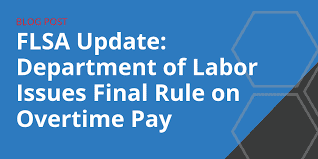
By Harvey B. Cooper and Peter M. Langdon
The United States Department of Labor has issued its final rules raising the minimum salary requirements for exempt executive, administrative, and professional employees (“EAP”). Effective January 1, 2020, to be exempt from the payment of overtime, the employee must be paid a minimum of $684 each week ($35,568 annualized) and satisfy the “duties test” for the claimed exemption.
The exemptions for outside sales employees and computer professionals paid at least $27.63 per hour are unchanged.
Here is a summary of the new rules:
- Standard salary level. The final rule raises the required salary from $455 a week to $684 a week or $35,568 annualized, for an EAP exempt employee.
- Highly Compensated Employees. The salary level for Highly Compensated Employees is increased from the current $100,000 to $107,432 a year. Highly Compensated Employees are exempt only if they perform at least one exempt duty and meet the Highly Compensated Employee salary requirement.
- Automatic updates. The Department of Labor intends to update the standard salary level and the highly-compensated salary level in the future, but it declined to set an automatic increase every set number of years.
- Bonuses, incentive payments, and commissions. Up to 10% of the salary threshold for EAP employees may be met by non-discretionary bonuses, incentive pay, or commissions, provided these payments are made on at least an annual basis. Highly Compensated Employees are not eligible for this benefit.
- Duties test. There are no changes to the duties tests that determine eligibility for the EAP exemptions. For employees with salaries above the updated salary level, employers must continue to use the same duties test to determine whether or not the employee is entitled to overtime pay. Remember satisfying the duties tests is determined on an individual employee basis, and not based on job classification or job description.
What should you do now? Employers should start planning and take the following steps in the next few months:
- Determine how your company will deal with the new salary requirements, particularly exempt managers, assistant managers, and administrative employees paid at least $23,660 a year. Will you raise their salary? Or will you change their status from exempt to nonexempt and pay overtime?
- Audit the job duties of each exempt employee to ensure the employee actually performs the duties for that exemption.
- Properly compensate all non-exempt employees for all hours worked. Remember, you must comply with the record keeping requirements of the Fair Labor Standards Act for all newly reclassified non-exempt employees.
- Determine the economic impact of paying additional overtime and what measures you need to take to control overtime.
- Continually audit. The salary threshold will regularly increase in future years chosen by the Department of Labor.
If you have questions about the final rules or need assistance complying with them, please contact Harvey Cooper or Peter Langdon at 402-392-1250 or by email at [email protected] or [email protected].

